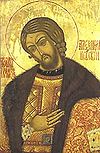- Dmitry Kozak
-
Dmitry Nikolayevich Kozak
Дмитрий Николаевич Козак
Deputy Prime Minister of Russia Incumbent Assumed office
14 October 2008Minister of Regional Development In office
24 September 2007 – 14 October 2008Preceded by Vladimir Yakovlev Succeeded by Victor Basargin Personal details Born 7 November 1958
Bondurovo, Kirovohrad Oblast, Ukrainian SSR, Soviet UnionDmitry Nikolayevich Kozak (Russian: Дмитрий Николаевич Козак) (born 7 November 1958 in Kirovohrad, Ukrainian SSR), is a Russian politician, serving since October 2008 as deputy Prime minister of the Russian Federation.
He was previously regional development minister in the Russian cabinet headed by Viktor Zubkov and in 2004-2007 he served as presidential plenipotentiary representative in the Southern Federal District (North Caucasus and Southern European Russia).[1]
Dmitry Kozak is known as a close ally of former president and current prime minister Vladimir Putin, having worked with him in the St Petersburg city administration during the 1990s and later becoming one of the key figures in Putin's presidential team.
During the 2004 Russian presidential election he was head of Putin’s election campaign team.[2] Kozak was one of several members of Putin's circle touted in the media as a possible candidate to succeed Putin as president in 2008.[3]
Kozak is married and has two sons.
Contents
Early life and career
Dmitry Kozak was born on 7 November 1958 in the village of Bondurovo in the Kirovohrad region of the Ukrainian Soviet Socialist Republic.[4]
Kozak graduated from Leningrad State University (now St Petersburg State University) in 1985 with a degree in law. From 1985-1989 he worked in the Leningrad prosecutor's office as a prosecutor and senior prosecutor. He moved into the business sector in 1989, working as head of the legal department at Monolit-Kirovstroy construction company and chief legal consultant for the Association of Trade Ports.[5]
Political career
He worked as a public prosecutor in Leningrad and after the collapse of the Soviet Union held various offices in the city’s administration, mostly in a legal department. In 1998 he became deputy governor of Saint-Petersburg.
In 1999, together with other officials from this city, he entered Putin’s government. He held the post of chief of staff from 1999 to 2000. Dmitry Kozak became deputy head of the presidential administration and remained in this position under various titles until 2004. In 2003 he briefly entered international politics and unsuccessfully attempted to solve the conflict between Transnistria and Moldova (see Kozak memorandum).
In September 2004 Kozak was appointed presidential plentipotenitary envoy to the Southern Federal District, replacing Vladimir Yakovlev. On September 24, 2007 he was appointed to the new Russian cabinet headed by Viktor Zubkov as regional development minister, succeeding Vladimir Yakovlev again, and leaving his previous position. On October 14, 2008 he became deputy prime minister of Russia.
References
- ^ Putin announces new Russian government line-up, Reuters, 24 September 2008.
- ^ Putin ally takes charge of 2014 Olympics preparations, Russia Today, October 14, 2008
- ^ Russia's Medvedev: Expect surprises in Kremlin race, Reuters, 30 September 2007.
- ^ Biography of Dmitry Kozak, Kommersant, 25 September 2007 (in Russian).
- ^ Biography of Dmitry Kozak, RIA Novosti website, 24 September 2007 (in Russian).
External links
- Dmitry Kozak: Biography on Russian government website (in Russian)
- Dmitry Kozak: Biography on Renaissance Capital website
Preceded by
Vladimir YakovlevPresidential Envoy to the Southern Federal District
September 13, 2004 - September 24, 2007Succeeded by
Grigory RapotaPeople from Russia Leaders and religious - Pre-1168
- 1168–1917
- 1922–1991
- 1991–present
- RSFSR leaders
- General secretaries
- Soviet premiers (1st deputies)
- Soviet heads of state (and their spouses)
- Prime ministers (1st deputies)
- Foreign ministers
- Prosecutors general
- Metropolitans and patriarchs
- Saints

Military and explorers - Field marshals
- Soviet marshals
- Admirals
- Aviators
- Cosmonauts
Scientists and inventors - Aerospace engineers
- Astronomers and astrophysicists
- Biologists
- Chemists
- Earth scientists
- Electrical engineers
- IT developers
- Linguists and philologists
- Mathematicians
- Naval engineers
- Physicians and psychologists
- Physicists
- Weaponry makers
Artists and writers Sportspeople - Chess players
Categories:- 1958 births
- Living people
- GRU officers
- Russian politicians
- Russian people of Ukrainian descent
Wikimedia Foundation. 2010.
